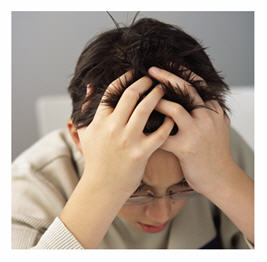It’s been reported multiple ways in various publications: How Depressives Surf the Web – in the New York Times – and more recently, in the NY Daily News.
Patterns of Internet behavior can flag depression, so why not create an app to track those patterns and, well… flag the depression?
And it follows of course that once labeled as such, the individual will seek counseling (or medication), right?
Likewise, if a parent has a tool that monitors teen computer and cell phone use, then he or she will note and address depressive surfing tendencies and again, seek help.
Great idea, no?
In my view, not so much.
And now, the disclaimer, loud and clear: I’m a parent – not a therapist, not a counselor, not a physician. However, reading this sort of news item (which seemed silly at first), every hair on the back of my neck is now standing up.
The more I contemplate the ramifications, the more I furrow my brow and worry for our collective futures.
Teenage Depression
If we’re speaking of adults, I’m inclined to believe that someone suffering from depression has a few clues beyond who, what, when, where, and how they surf on the web.
I can see possible applicability for a younger child – though theoretically we’re monitoring what he or she is doing on the web – at least to some extent – and more importantly, we’re aware of other signs they’re in distress.
As for usefulness of this software approach for teens? I’m able to wrap my mind around a parent using any available information to help, but this – as a potential mechanism – seems unlikely.
If we’re talking specifically about teenagers and signs of depression, how exactly do we sort them out?
There’s depression versus substance abuse, substance abuse versus sleep deprivation, sleep deprivation versus a broken heart, a broken heart versus a broken iPhone. Then there are the causes of depression – that broken heart or iPhone among them – not to mention bullying, issues of self-esteem, burgeoning sexuality, peer pressure, school pressure, competitive pressure (from us), and so much more.
Might I add – a legitimate desire to escape Mom or Dad? And those pesky hormones?
As for depression, the signs may include anger, distance, acting out, tearfulness, irritability, fatigue, and more, which is referenced (and mentioned) below. And then there is the challenge of distinguishing these from signs of drug or alcohol abuse.
Signs of Depression
I don’t mean to be glib, but the patterns to which the originating article refers – switching quickly among applications, emailing frequently, checking out videos – are behaviors I engage in when I’ve put in a 14 hour day and I need something that allows me to ease into a state of relaxation.
Surfing may be just what the doctor ordered. Then again, I might opt for Housewife in Face Paint reruns or a classic Bette Davis movie.
Will you send Men in White Coats to fetch me over either of these choices?
We’re all aware of the warning signs when it comes to adult depression – not dissimilar from teenage depression, though some sources indicate irritability and anger may be more prevalent in teens, along with reckless behavior and violence.
 Still, adult (as well as teenage) signs of depression may include the following symptoms:
Still, adult (as well as teenage) signs of depression may include the following symptoms:
- change in eating and sleeping patterns
- aches and pains
- sadness, anger, irritability
- suicidal thoughts
- withdrawing from social interaction
- losing interest or motivation, including for sex
- poor performance at work (or school).
And yes, we may self-medicate with food, drink, drugs, smoking, sex, television, texting, or surfing the web – and other signs that a psychologist would be far better qualified to describe than I.
My point?
We’re not unaware when something is wrong. We’re not – or shouldn’t be – oblivious to our teenagers. Must our computers tell us our usage patterns are problematic?
Helping Kids Who Are In Trouble
We all want to reach a kid in trouble – particularly before things spiral out of hand. But I’m always skeptical when it comes to data, particularly interpreting data in small sample sizes (216 volunteer undergrads in this piece of research).
I am not the “target audience” for this study; I rely on the Internet for my work, I’m well aware of when I’m down and why, and equally, when I’m feeling great and why. Furthermore, I’m not an adolescent.
I don’t intend to make light of the subject matter which is serious business – depression, and excessive Internet dependence. But think about this, as I cite the New York Daily News version of this item:
“There were two major findings. First, we identified several features of Internet usage that correlated with depression,” wrote Sriram Chellappan and Raghavendra Kotikalapudi in an article for the New York Times. “Our second major discovery was that there were patterns of Internet usage that were statistically high among participants with depressive symptoms compared with those without symptoms.”
Researchers say the study results could be used to develop software that tracks users’ browsing patterns on mobile phones and campus networks. Such software could alert parents and university counselors when students display browsing habits that are indicative of depression.
The issues I have with this are multiple.
- One more instance of Big Brother observing our (theoretically private) behavior makes my skin crawl. Monitoring software on campus networks??? I give that a thumbs down.
- No teenager I know would allow any such monitoring technology on his or her cell phone, tablet, or other smart gadgetry.
- This is a band-aid not a fix, a commercial application to identify what is already identifiable; it addresses the symptoms, not the disease.
Ten years ago, couldn’t we have said the same of television watching habits? If we could have created a method of recording the rate of zapping, timing and choice of channels, would we have done so – to correlate to depression?
Band-Aids for Complex Social Issues?
At what point do we stop looking at band-aids to cover wounds, medications to ease (but not eradicate) the pain, gadgets to track (and report) all of it – with pharma and technology revenues attached?
Hasn’t this become our national pastime – particularly when it comes to health care, which is reactionary rather than preventive? Isn’t it the same when it comes to problems with our children – whether it’s childhood obesity (let’s not forget some of the wildly ridiculous knee-jerk reactions), alcohol and drug abuse, or emotional problems?
Isn’t this what we do when dealing with adults who are anxious or depressed? A quick-fix prescription, a recommendation for the latest diet, or a suggestion to get zen and focus on the present?
Of course we should ease pain! Of course there are legitimate reasons to medicate! But don’t we need to identify the cause for the disease, as we treat it – and its symptoms?
Zen… and Then?
As for calm, positivity, and Zen, I have nothing against any of it. On the contrary. We know the physiological impacts when we’re feeling less stressed, more grateful, and we attack challenges with a positive attitude.
 But if we’re too intent on “feeling the moment,” aren’t we less likely to dig for complex causes to problems, to commit to the hard work and time required to address them, to move beyond ourselves and our own needs to form a broader “helping” community?
But if we’re too intent on “feeling the moment,” aren’t we less likely to dig for complex causes to problems, to commit to the hard work and time required to address them, to move beyond ourselves and our own needs to form a broader “helping” community?
Perhaps you’ll tell me that one (the Happiness Mantra) doesn’t preclude the other (an Outward Action Orientation). I’d like to believe that’s the case.
But when I consider our propensity for the Next Great (Trendy) Thing – which may worsen the symptoms of social ills – more monitoring software? – I’m concerned about our willingness to put blinders on and act accordingly.
Treat the Pain, But Eradicate the Disease
Life these days isn’t a picnic. Its ups and downs are tough enough for the adults, though we have the maturity and experience to weather them – usually.
As parents, we may be overwhelmed, worn out, and distracted trying to keep afloat. When it comes to our children, we may miss some signs, and be aware of others. Ideally – in my opinion – we get our kids to counselors or physicians who can help.
Software to alert us to what may or may not be a problem?
A commercial application that may assist – somehow?
Who knows.
Technology is pervasive and growing more so. It cannot replace the need for human interaction – or intervention. It does not void the requirement to focus on preventive measures and root causes.
Personally, I prefer to tackle the basics: children need positive and loving adult role models; sound health and educational systems are the hallmarks of a civilized country; and there are no simple solutions to complex problems.
You May Also Enjoy

As you point out, the study used a very small sampling, too small to be conclusive. While they did claim to notice a correlation between the questionnaires and Internet usage, I’m not sure what it proves. It seems the intended software is meant to be the frontline against allowing teens and college students (even adults) to fall into deep depression; like a warning sign. “STOP what you are doing! You are exhibiting signs of depression! Go seek counseling, NOW!” However, the idea that counselors or others would monitor students’ usage to determine whether or not they are depressed is “Big Brother” technology. And what a slippery slope if such a thing were allowed.
Depression is a serious disease. Its causes and its treatment can be complex. I’m not sure that this study or the software is meant to make light of that; however, I agree with you that there are no quick fixes.
Wouldn’t being monitored by your computer or phone be depressing? I am pretty sure that it would cause me anxiety!
I have to wonder if the abusers of this Big Brother software would be parents. This is one place that privacy issues can be easily breached, no matter how much teens protest. Parents are often the ones who supply their teens with the computer, the smartphone, etc.
Children and teens definitely need “positive and loving adult” role models. And I think this software seems a little uncivilized. Very comprehensive article; a great post, especially your conclusion!
You are so right to point out the disease aspects, and I didn’t even mention the relationships / distinctions between anxiety and depression, much less the chemical aspects.
All the more proving your point – this isn’t an issue most of us would trust to computer usage patterns. I don’t believe the authors of the study were proposing that on its own, certainly, and while I’m in favor of all sorts of research that helps us understand ourselves better, I’m not seeing any real “upside” to any of this, other than as a bit of (unreliable?) data.
Gee, do I demonstrate high “flow duration entropy”? How are my “p2p packets”? Of course, if I turn off my computer and stare at the walls, the outside world will think I’m just hunky-dory. Now if you’ll excuse me, I need to tend to me chickens in Farmville and slay a dragon or two in World of Warcraft. Oh yeah, and blog, tweet, post on Facebook, Open Salon, BlogHer, and Zimbio. OMG! I really am sick. Now is that depressing or what? 🙂
This article does not explore the complexity of mental illness. For starters, there is a big difference between situational/episodic depression – which can happen to anyone – and life-long depression. Unfortunately, mental illness has been introduced into pop culture as a term people flippantly use. “I am so depressed because X.” In reality, there is a difference between having a depressive episode because of something that is happening in your marriage or not feeling satisfied in your job/home life or dealing with the death of a loved one. But, for those who suffer with life-long depression these studies undermine the wealth of research available to actually help them.
After years of struggling with mental illness, I have only recently discovered what anxiety and depression are, far beyond how pop psychology defines it. Even the list of symptoms of depression is inadequate because depression varies widely by person. An adequate history of that person’s mental health is more efficient than monitoring their computer use as computer use could indicate that a person is struggling with life at the moment not that they are actually depressed.
Excellent points, Amber – on all counts. As your own story and experience remind us.
I was with you until this:
“But if we’re too intent on “feeling the moment,” aren’t we less likely to dig for complex causes to problems. . .”
I hope by “feeling the moment” you don’t mean being present with oneself. Most of my problems, I have found, happen when I run from my feelings.
It is getting to be a big problem for our teenagers as they are becoming more addicted to their smartphones and desktops or laptops. They are building their worlds within those boxes and they are losing a lot. Those symptoms are the signs of a greater problem and it is important for parents to look at it.